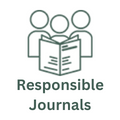Ethics and good practices politics
Editor's Responsibilities
- Editorial decisions will be based on criteria of objectivity, academic quality and the performance of editorial functions and not on prejudices or discriminatory acts associated with religious beliefs, sexual or political orientations.
- Articles will be accepted based on academic merit and not on the influence of academic institutions sponsoring the research from which the contribution results.
- Prevent the publication of articles where there has been (or is presumed to have been) misconduct in the research process.
- To deal responsibly and diligently with situations generated by inappropriate ethical practices that may call into question the credibility of Universidad Católica Luis Amigó, Perseitas, the authors, the institutions sponsoring the research and other actors linked to the journal.
- Communicate to the authors in a timely and clear manner the dynamics of the process of evaluation, editing and publication of articles in order to demonstrate the transparency and objectivity of the process.
- Properly handle academic or personal data in addition to those requested in the author's note and guarantee that they will be used only for the inclusion of the journal in the Indexing and Abstract Systems.
- Will not reveal the names of the authors to the reviewers, and vice versa, while the process of editing and revision of the texts is being carried out.
- Under no circumstances will the journal editor require the author to cite the journal or publish articles with conflict of interest.
Evaluator’s Responsibilities
- Declare the existence of conflicts of interest when the case arises.
- Guarantee that their opinion is derived from an objective evaluation and not from biases associated with religious beliefs, sexual orientations, politics or financial, labor or professional considerations that may influence the opinion.
- Inform the editor of Perseitas about possible violations against good ethical practices and the implications they may entail.
- Colombian reviewers must fill in and update at least the following information in the CvLAC application (Scien-TI-Colombia platform: https://scienti.minciencias.gov.co/cvlac/Login/pre_s_login.do): names, first surname, second surname, identity document, professional career, academic background and e-mail. The journal Perseitas suggests including as much information as possible about the research career.
Author’s Responsibilities
- Authors must declare that the work is original, unpublished and is not being simultaneously evaluated in another journal.
- Authors undertake to respect national and international laws on Copyright and Protection of minors.
- Authors must explicitly state in their contribution the name of the entities that financed the development of the research that gave rise to the contribution.
- Authors agree not to withdraw the article after peer review, if the peer review determines the viability of publication.
- Authors must participate in the evaluation process by attending to the adjustments that the peer reviewers make to their contribution as long as these help to improve the academic quality of the article.
- If the article is presented in co-authorship, the authors related to the contribution should have participated in a significant way in the elaboration of the article.
- In case of doubt or dispute of authorship and co-authorship, the editing process and the publication of the text will be suspended until it is resolved.
- Authors are obliged to submit retractions or corrections of errors if necessary.
- Colombian authors must have filled out and updated at least the following information in the CvLAC application (Scien-TI-Colombia platform: https://scienti.minciencias.gov.co/cvlac/Login/pre_s_login.do): names, first surname, second surname, identity document, professional career, academic background and e-mail. The journal Perseitas suggests including as much information as possible about the research career.
- Colombian authors must have filled out and updated at least the following information in the CvLAC application (Scien-TI-Colombia platform: https://scienti.minciencias.gov.co/cvlac/Login/pre_s_login.do): names, first surname, second surname, identity document, professional career, academic background and e-mail. The journal Perseitas suggests including as much information as possible about the research career.
Complaints
- If once the article is published: 1) the editor discovers plagiarism, adulteration, invention or falsification of content and author's data or substantive errors that threaten the quality or scientificity, he/she may request its withdrawal or correction. 2) If a third party detects the error, it is the author's obligation to retract it immediately and proceed to the withdrawal or public correction.
- All complaints will be received in writing by e-mail (perseitas@amigo.edu.co). The maximum response time will be five working days from receipt of the disagreement.
Procedure for settling disputes arising from unethical behavior
- Identify, before asserting that unethical behavior has occurred, the nature of the misconduct and the corroborating evidence.
- Do not issue any judgment or observation associated with particular situations under study until all the evidence has been gathered and the existence of the misconduct is fully established.
- Submit to the editorial board the evidence corresponding to the case so that it may consider, according to the nature of the misconduct, the actions to be taken in response to the misconduct.
Among the actions that could be applied, depending on the nature of the misconduct, are the following:
- Informing the author about the misconduct, correcting it and calling attention to it so that it is not incurred in future publications.
- Formal retraction with publication of an editorial note informing the reason for the retraction and drawing attention to the importance of good ethical practices.
- Withdrawal of the article with publication of an editorial note stating the reason for the withdrawal and drawing attention to the importance of good ethical practices.
- Inform the financing entities, academic or commercial, about the fault and its implications in order to promote good ethical practices among their researchers.















